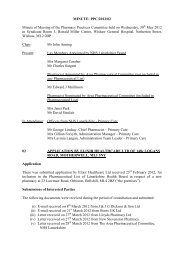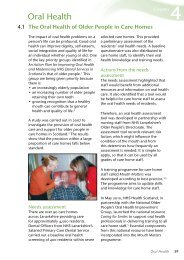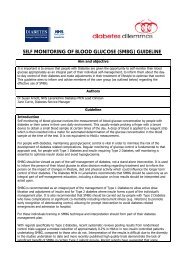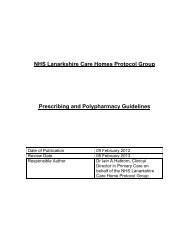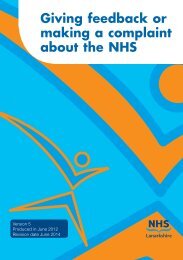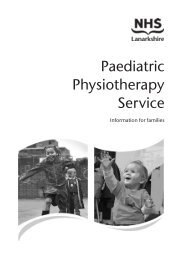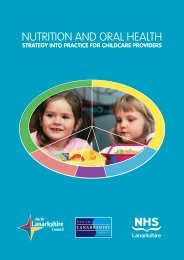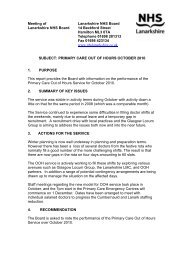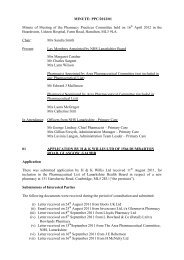Palliative Care Guidelines - NHS Lanarkshire
Palliative Care Guidelines - NHS Lanarkshire
Palliative Care Guidelines - NHS Lanarkshire
- No tags were found...
Create successful ePaper yourself
Turn your PDF publications into a flip-book with our unique Google optimized e-Paper software.
<strong>Palliative</strong> <strong>Care</strong> <strong>Guidelines</strong>: AnorexiaAnorexia / Cachexia in <strong>Palliative</strong> <strong>Care</strong>IntroductionAnorexia / cachexia syndrome is a complex metabolic process found in many end-stage illnesses.Characterised by loss of appetite, weight loss and tissue wasting, it impacts significantly onquality of life. It causes anxiety and distress for patients and, perhaps even more, for carers.Assessment• Look for any reversible problems that may exacerbate anorexia including:• pain • dyspnoea • depression• nausea • vomiting • constipation • dysphagia• heartburn • gastritis • anxiety • medication• oral problems: dry mouth, ill fitting dentures, ulcers, candidiasis etc.• odours – fungating lesion, fistulae, cooking smells, and incontinence can contribute toanorexia.• delayed gastric emptying (eg. due to local disease, autonomic neuropathy) causing earlysatiety, and vomiting of undigested foods that relieves nausea• Find out about patient and carer perspectives on weight, body image, nutrition, dietary intake.Psychosocial aspects are very important.• Fatigue is commonly associated with anorexia/ cachexia. (see: Fatigue)ManagementGeneral• Prevention or early identification and treatment of contributory symptoms.• Acknowledge the psychological impact on the patient and carer; ongoing discussion andsupport are needed.MedicationLimited benefit, but worth considering, as may improve quality of life.Corticosteroids• Established role in short-term improvement of appetite.• Rapid effect, but tends to decrease after 3-4 weeks.• May also reduce nausea, and improve energy/ general feeling of well being.• No significant effect on nutritional status.• Starting dose: oral dexamethasone 4mg or prednisolone 30mg in the morning. Considerneed for a proton pump inhibitor.• Side-effects: fluid retention, candidiasis, myopathy, insomnia, gastritis.• Prescribe for 1 week, if no benefit, stop. If helpful, reduce to lowest effective dose; reviewregularly and withdraw if no longer improving symptoms.Progestogens• Improve appetite and increase weight in patients with cancer.• Take a few weeks to take effect but benefit more prolonged than steroids.• More appropriate for patients with a longer prognosis.• Megestrol acetate - starting dose 160mg orally daily for one month, then review. Dose range(160-800mg). No evidence for optimal dose.• Side effects: nausea, fluid retention, increased risk of thromboembolism.• Reduce dose gradually if used for more than 3 weeks (adrenal suppression).Prokinetics• Used for early satiety, delayed gastric emptying, gastroparesis or nausea.• Metoclopramide 10mg or domperidone 10-20mg (less long term side-effects) given threetimes a day half an hour before meals.© <strong>NHS</strong> Lothian Issue date: January 2009 Review date: March 20121




